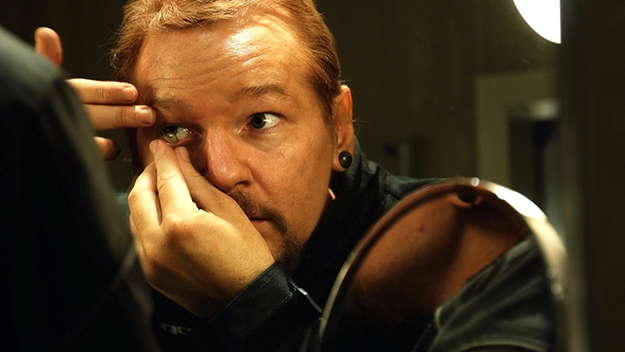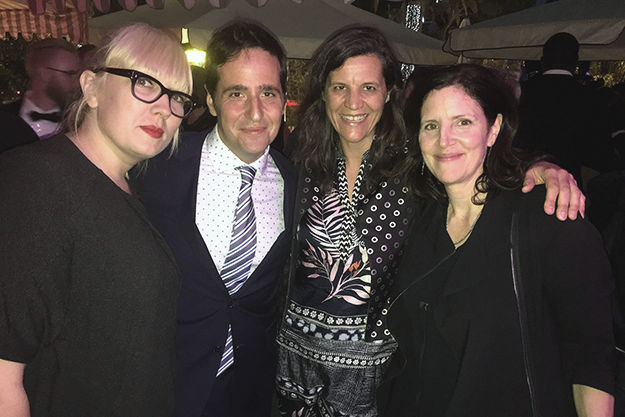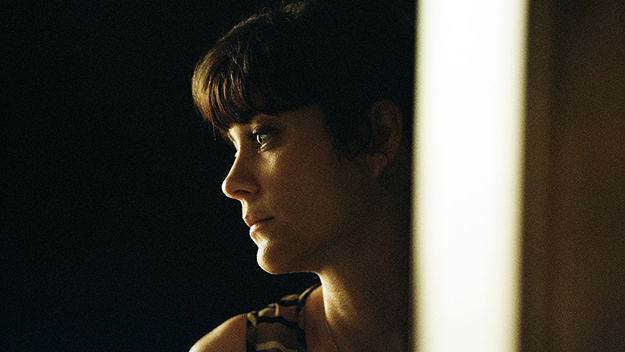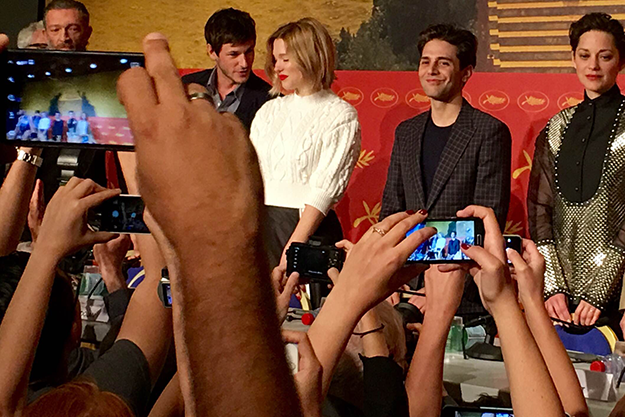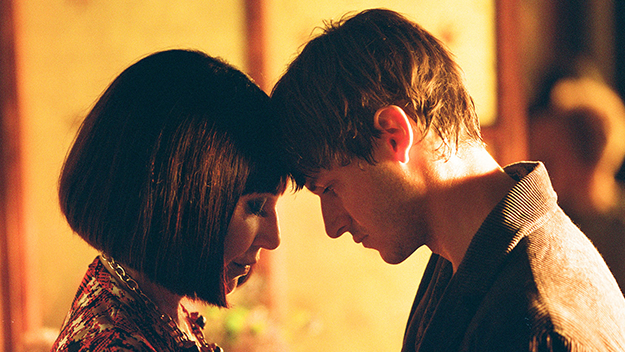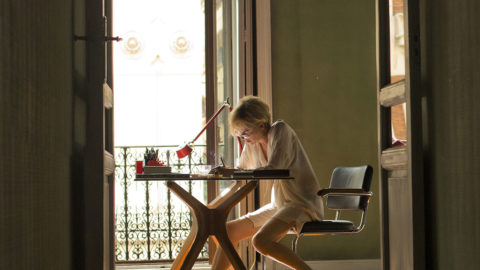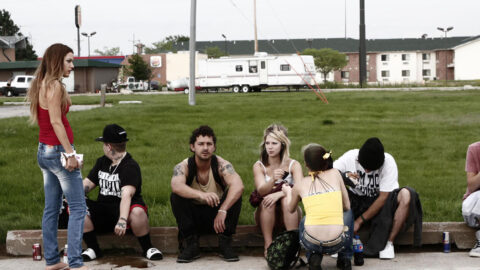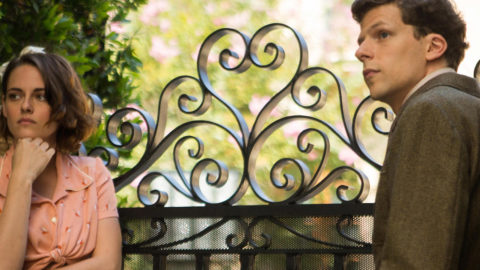Cannes Dispatch #4: Risk & It’s Only The End of the World
As the Cannes Film Festival heads into its final few days, it fixed a spotlight on another pair of anticipated world premieres. Laura Poitras, the acclaimed documentary filmmaker and journalist unveiled her latest feature, this one with her eye trained on Julian Assange, while young Canadian auteur Xavier Dolan debuted his new film, an adaptation of an acclaimed play, starring a high-profile cast of acclaimed French actors.
Risk
Wearing a leather jacket, his hair dyed a new shade but hidden underneath a protective helmet (and his eye color altered by contacts, yet obscured by dark sunglasses), Julian Assange is on a motorcycle, riding through the streets of London. In this poignant sequence from Laura Poitras’s new documentary, Risk, he’s freely weaving in and out of traffic while Radiohead’s “I Might Be Wrong” plays on the soundtrack.
Assange’s bike trip plays as a rare recent moment of liberation for the Australian activist. Throughout the movie, Poitras provides exceptional access to Assange—his own mother is seen in a London hotel room helping to disguise his identity—and his WikiLeaks colleagues. And Poitras’s camera observes movements and strategy sessions, including an attempt to reach then–Secretary of State Hillary Clinton prior to a WikiLeaks information release.
Embedded with Assange over the past five years, Poitras is again up close with a controversial, exiled figure, as she was with Edward Snowden in her Oscar-winning 2014 documentary, CITIZENFOUR. In Risk, she also tracks the rise of Sarah Harrison, an Assange confidant from WikiLeaks, who stood onstage today in Cannes alongside Poitras, and Jacob Appelbaum, a close associate of Poitras’s, who is seen in CITIZENFOUR as well as her latest film.
Poitras’s new film has evolved over the past year. Last fall she presented what would become segments from this new 10-chapter vérité documentary at the New York Film Festival, while launching Field of Vision, the episodic nonfiction outlet she formed with Charlotte Cook and AJ Schnack.
Photo by Eugene Hernandez
Since screening about 30 minutes of this new work, then called Asylum, at NYFF, Poitras joined forces with Sam Esmail. Poitras is a self-proclaimed fan of his award-winning hacker and surveillance drama Mr. Robot, and Esmail came on board as an executive producer of Risk.
“Laura’s riveting and perceptive new film leaves you with relentless introspection,” Esmail said in a statement when Risk was announced as a Cannes Directors’ Fortnight selection. “Risk is a fresh take on the renegades, the cypherpunks, the risk-takers. As much as I’ve read about the captivating Assange throughout the years, this beautifully rendered portrait managed to deepen my understanding in unexpected ways.”
Assange’s friends and champions seized the moment this morning in Cannes, speaking out in his support during a discussion following a press and industry screening of Risk before tonight’s official premiere screening. “Julian Assange, the subject of this film, cannot be here today,” Harrison explained. “He is detained without charge. He is in an embassy surrounded by police and has been held by the United Kingdom for the last five years.” “Julian Assange is a political prisoner,” Appelbaum weighed in. “His illegal detention and political persecution must end.” Assange hasn’t seen sunshine in four years, his advocates said today in France.
Risk also highlights Poitras’s own continuing struggles with surveillance by American authorities, something that was also explored in a recent Whitney Museum exhibition.
In Risk, leaked FBI audio evidence reveals proof that Poitras is considered anti-American for her work on these recent films. She noted that surveillance and watch-list status began after she made the Iraq War documentary My Country, My Country (06).
“Recently I’ve been filing a lawsuit against the government to find out about my case,” Poitras said this morning. “And it confirms that there was a secret investigation for terrorism for the work that I do. As far as I know, it’s ongoing.”
It’s Only the End of the World
At a dinner in Cannes on the eve of the opening day of the festival, a leading journalist from Canada said that he wanted Xavier Dolan to win the Palme d’Or this year. A veteran Cannes attendee, the journalist said that budgets are tight and his editor back home questioned the value of sending him to the festival. “I hope that Xavier wins,” the journalist said. “Because if he does it will make it easier for me to cover the festival next year.”
Reactions to Dolan’s new film, It’s Only the End of the World, were rather polarizing in the wake of its initial festival screenings. The sixth movie in just seven years by the 27-year-old Quebecois filmmaker is more confined than his previous work and less reliant on the visual and musical flourishes seen in some of his other films. Watching the movie, viewers may be surprised to experience a rather claustrophobic feeling. Despite a couple of colorful flashbacks, the film is essentially a chamber piece, marked by abrasive explosions of dialogue as its characters confront one another on-screen.
“We are in Cannes, there are different views on film. That was true of Laurence Anyways,” Dolan said today at the festival, referring to the response to his third film here three years ago. “Some films are warmly welcomed, others less so.” “I am not particularly worried,” he added. “There have been glowing reports that have been published.”
Based on the play of the same name by Jean-Luc Lagarce, who died of AIDS in the mid-’90s, It’s Only the End of the World features Gaspard Ulliel as Louis, the prodigal son in his mid-thirties who returns home after a dozen years. He plans to tell his siblings and mother that he’s about to die, but immediately upon walking through his family’s door, he is confronted with their intense altercations and decides to hold back.
Photo by Eugene Hernandez
In Cannes today during a press conference, the actors from the film—Ulliel, Nathalie Baye, Vincent Cassel, Marion Cotillard, Léa Seydoux—all major performers in France, discussed the unique intensity of making this film and the precise way in which Dolan directed them.
“I was very scared about the text to start with,” Cotillard said. Another actor was more rattled by the camera, which Dolan placed up close to his actors. “To start with, I was very intimidated,” offered Ulliel. “We had this impression—as if we were being filmed with a microscope—that everything we were saying would be amplified.”
With maybe just a dozen scenes, shot in just a few rooms, the film is filled with extended takes and close-ups of the actors going at each other. Dolan called the film’s one-venue setting “a no-exit environment for actors,” and added that, “the play calls for that sort of suffocating atmosphere.”
“I felt it was necessary to be very close, there are so many things that you can read into the silences here, the tension in the faces. I thought that it would be a shame not to use close-ups,” Dolan noted. “The story is very human, people often say this. Silences say a lot. Who is looking at who, while that person is looking at someone else.”
The cast reacted well to working with Dolan, a fellow actor since a young age—who has appeared in a number of his own movies—offering insights into his approach to filmmaking.
It’s Only the End of the World
“It was quite incredible, he’s a very endearing person. You love him and want him to love you,” Seydoux said of Dolan, as he grinned sheepishly next to her. “The way he directs the actors is special, he intervenes a lot on the set. At first that is a little unsettling. Xavier is always present, he is always with us. He is aware of everything that is happening. The way people breathe. He is measuring the emotions. He’s so precise, almost like a surgeon.”
Cotillard agreed and exhibited a similar camaraderie with the director and his intimate approach: “The camera is so close that you can kind of forget about it and the camera, like Xavier, became part of the group. We were a single body and we breathed as one.”
“Everything is so worked out beforehand and yet we have a lot of freedom on set,” added Cassel. “The camera never stops. He talks during the take, telling us to try things. On paper it seems very structured, but there’s tremendous freedom.”
“It’s about language, it’s about communication,” Dolan said of his new film. “Maybe it takes a bit of time for the film to establish itself. People shouldn’t just look at it, but listen to it.”
Asked about the divided response to the movie after early screenings, Dolan responded, “I am very pleased to be here with people I love and with whom we’ve made a film of which I am very proud.” He said that people should take pride in one’s work and own it, in order to move forward and grow. “According to me,” Dolan told the press in Cannes today, “it is my best film.”



